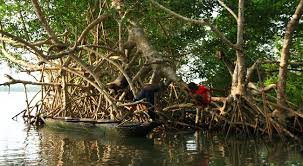Nigeria’s southern state, Cross River has made a huge commitment towards urgent restoration of the mangroves with sustainable solutions.
This was made known by the Bassey Otu, Governor of the State, one of nine others on Wednesday when members of the National Council on Climate Change Secretariat visited the state.
During the visit, the Governor highlighted the state’s proactive approach, noting that Cross River was the first to sign the Climate Change Law while reaffirming the administration’s commitment to tackling climate change.
Nigeria’s Niger Delta mangrove ecosystem is the third largest mangrove in the world with an area of about 36,000 kilometre square. It occupies the stretch along the coast across nine states including Abia, Akwa Ibom, Bayelsa, Cross River, Delta, Edo, Imo, Ondo, and Rivers.
“Our mangroves have suffered, but we are working on sustainable solutions. This is a testament to our full support and commitment to climate action. Our roadmap is strong, and our people are ready to collaborate for a greener economy,” Out stated.
In a statement by his Chief Press Secretary, Nsa Gill, the Governor also stressed the importance of collaboration and collective action in addressing environmental challenges, calling for increased support for ongoing projects and greater investment in training and awareness initiatives at the community level.
Dr. Nkiruka Maduekwe, Chief Executive Officer of the National Council on Climate Change Secretariat and Special Presidential Envoy on Climate Change who spoke during the visit commended Cross River State for its leadership in climate governance.
“We are excited to see a state that has not only adopted the Climate Change Law but has also developed a solid framework for a green economy. While we continue to engage other states, Cross River stands out as a model in driving climate action,” she said.
She further described mangroves as Nigeria’s ‘low-hanging fruit’ in climate mitigation, highlighting their economic and environmental significance. She announced that a stakeholder town hall meeting was held in Calabar, the State capital to establish a concrete roadmap for mangrove restoration and conservation.
She emphasized the importance of a legal framework for effective climate action, stressing that operationalizing a climate change fund would be crucial in attracting global financial support.
Dr. Mrs. Edu Effiom, Director General of the Cross River State Council on Climate Change, reiterated the state’s efforts in mangrove restoration and carbon investment.
“We have been working tirelessly to restore our mangroves, and we are making significant progress. We are also grateful for the Governor’s commitment to the green economy and the dedicated team driving this initiative,” she stated.





